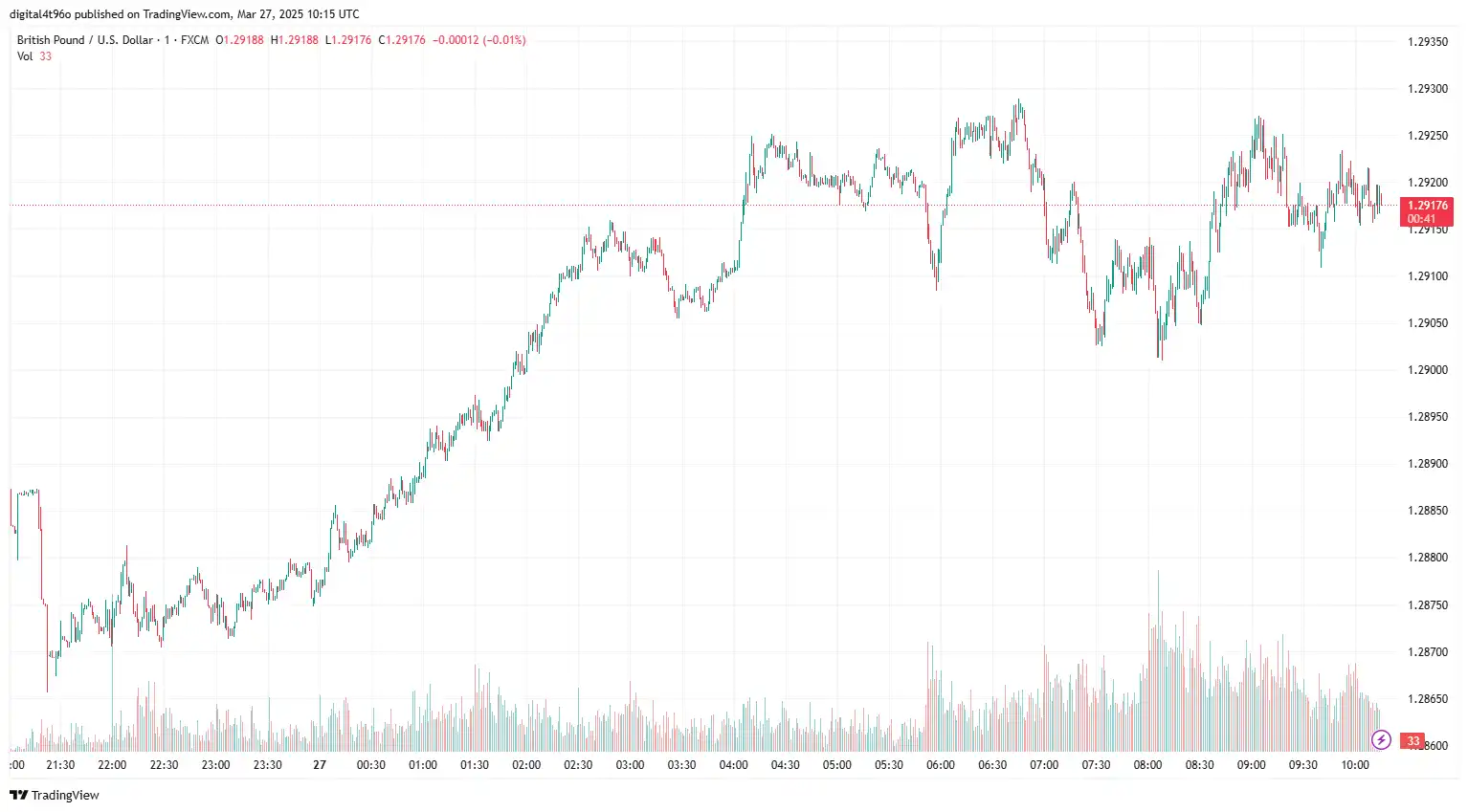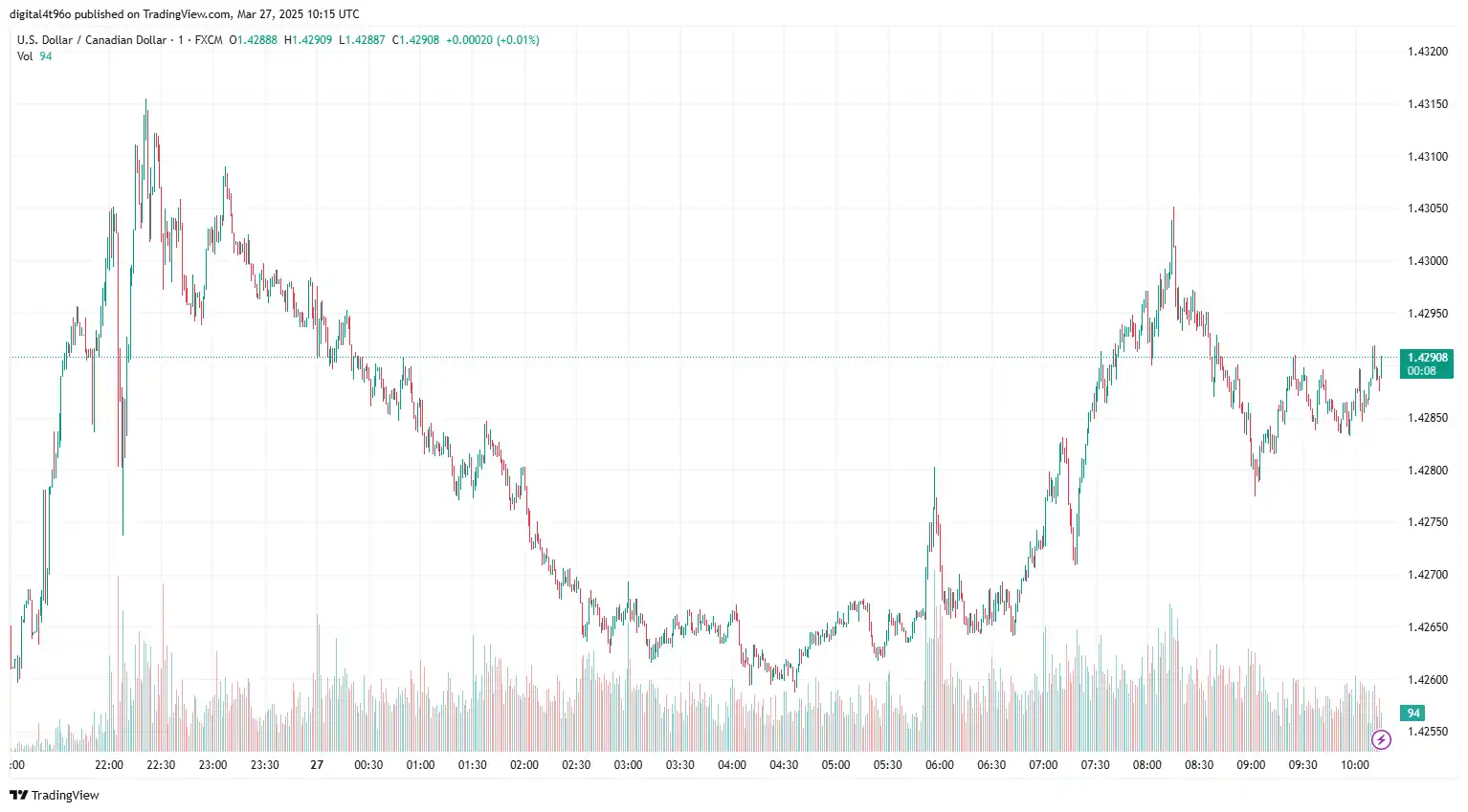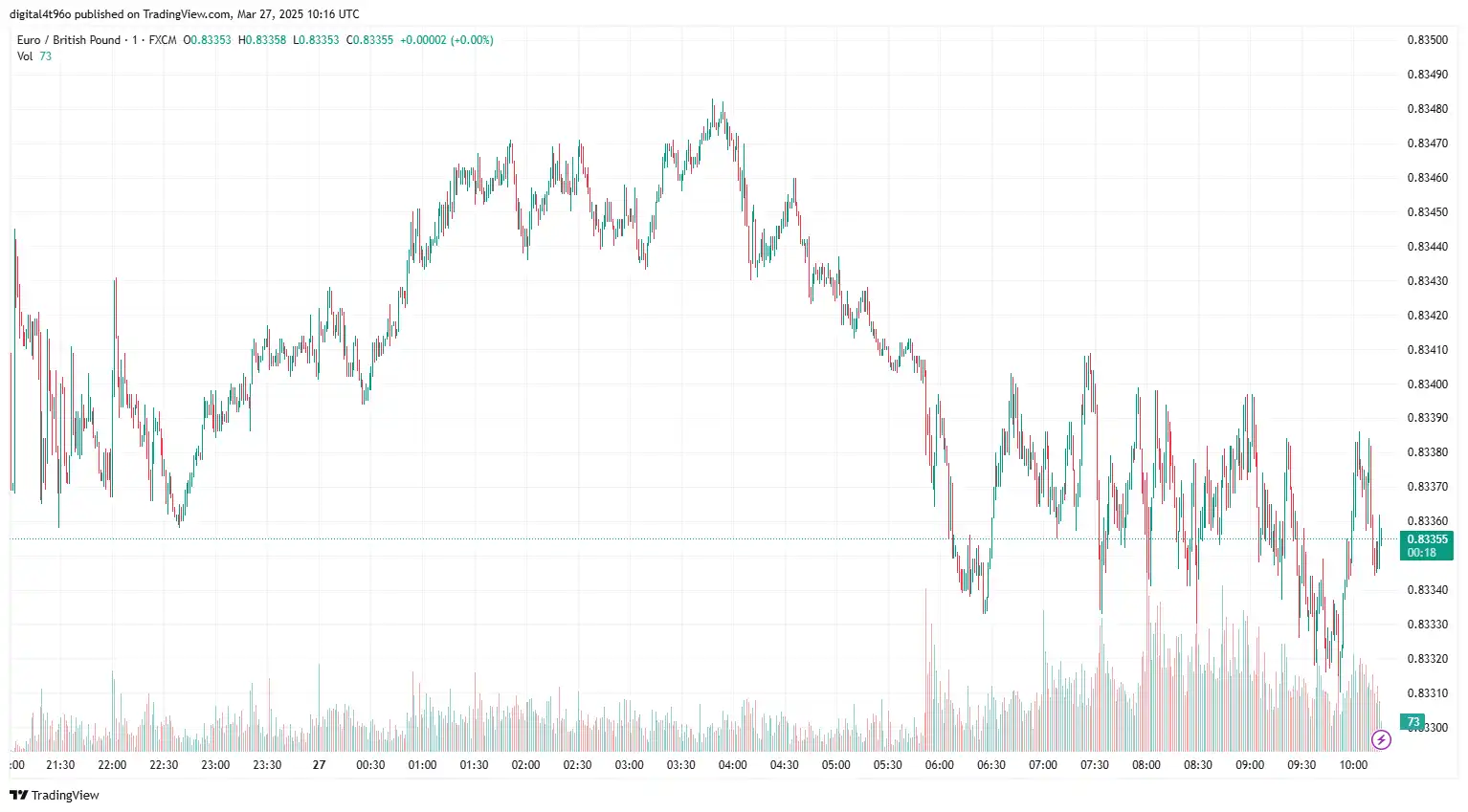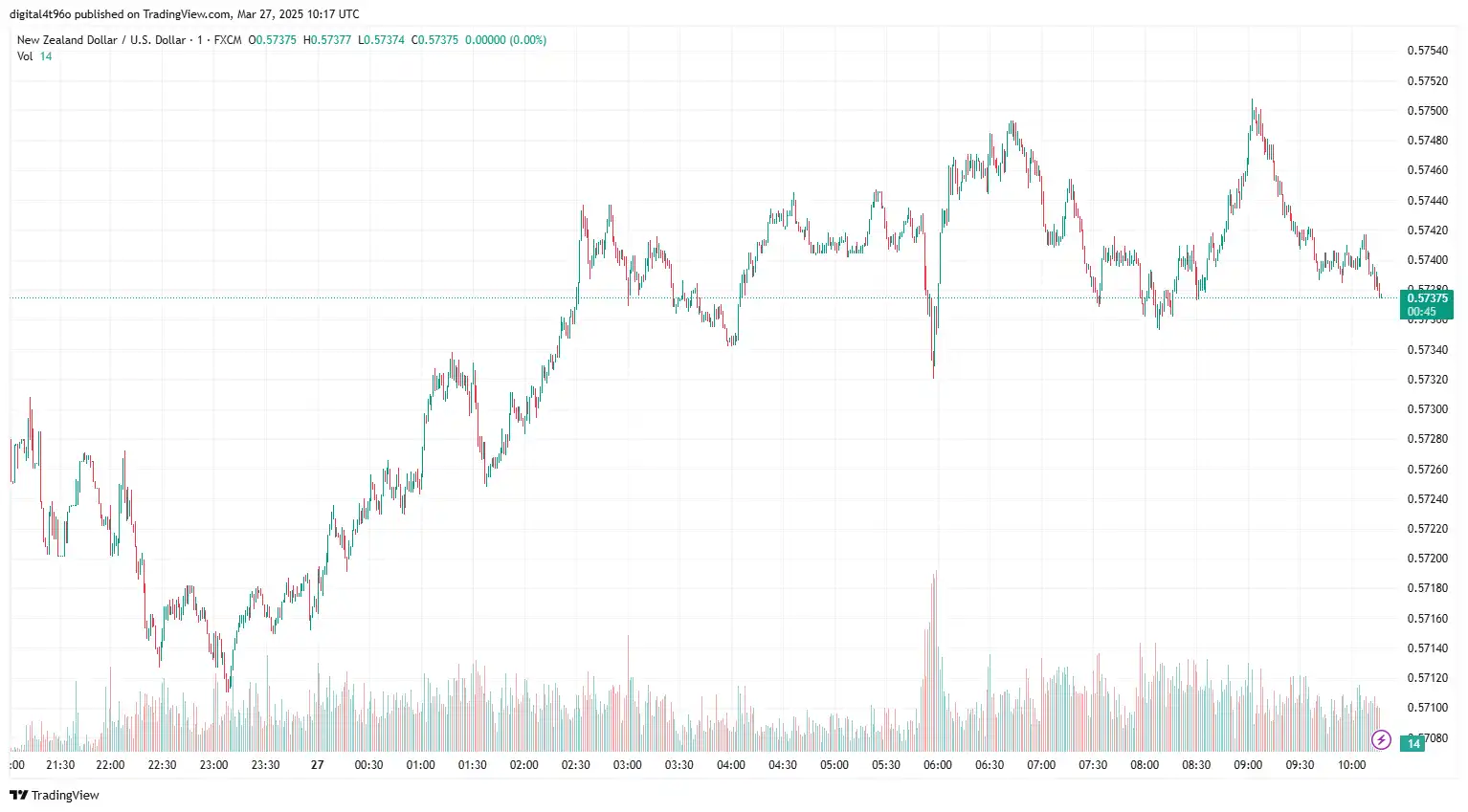GBP/USD Slumps After UK Budget Update
The Pound lost ground against the US Dollar, trading near 1.2909, following softer-than-expected inflation data and Chancellor of the Exchequer Rachel Reeves' Spring Budget. Headline CPI rose by 2.8% year-on-year (YoY), falling short of estimates of 2.9% and the 3.0% increase recorded in January. During the same timeframe, the core CPI – which excludes volatile items – increased by 3.5%, compared to expectations of 3.6% and the previous release of 3.7%. On a month-on-month basis, headline CPI grew by 0.4% following a deflation of 0.1% in January, missing estimates of 0.5%. In the Spring Budget, Chancellor Reeves scaled back government spending plans while adhering to her fiscal goals. Key highlights include welfare cuts exceeding £3.4 billion and a reduction in current spending by over £3.6 billion. There were no changes to the fiscal rules allowing for additional borrowing, whilst defence spending is set to rise by £6.4 billion by 2027. The UK's Office for Budget Responsibility (OBR) revised its forecasts, predicting 1% economic growth in 2025, a decrease from the 2% projected in October. Inflation is expected to hover around 3.2%, up from 2.6% in the autumn budget for 2025, and will decline to 2.1% in 2026. The softer inflation has reinforced the speculation that the Bank of England (BoE) will opt for the monetary policy easing approach.
On the other hand, US President Donald Trump's recent tariff threats influenced market sentiment around the greenback. He commented on his social media, "If the European Union works with Canada in order to do economic harm to the USA, large scale Tariffs, far larger than currently planned, will be placed on them both in order to protect the best friend that each of those two countries has ever had." On the data front, US Durable Goods Orders were robust in February, according to the US Department of Commerce. Orders increased by 0.9% month-on-month, surpassing the forecast of a 1% contraction. Core Durable Goods Orders, excluding transportation, rose by 0.7% month-on-month, up from 0.1% in January and exceeding the estimated 0.2% increase. On Tuesday, the Richmond Fed's manufacturing index plummeted to -4 in March, down from +6 in February. This decline indicates weaker shipments and new orders, with the new orders index dropping to -4 and the employment index declining to -1. The negative figure points to a contraction in the manufacturing sector. Consumer confidence also fell in March, decreasing to 92.9 compared to 94.2 in February.
In the absence of key economic data from the UK, upcoming US economic data, including weekly Initial Jobless Claims and the final Q4 Gross Domestic Product (GDP) Annualised report, will direct the GBP/USD's movements.

USD/CAD Subdued Amid Impending US Auto Tariffs
USD/CAD weakened near 1.4292, as concerns surrounding expected US auto tariffs and alleviated geopolitical tensions undermined the Canadian dollar (CAD). Late on Wednesday, President Donald Trump signed an order imposing a 25% tariff on auto imports, escalating the global trade conflict. He warned, "If the European Union works with Canada to harm the US economy, large-scale tariffs, much higher than currently planned, will be imposed on both to protect the best friend that each of those two countries has ever had." The new tariffs will take effect on April 2, with collection starting the following day. This move puts pressure on the Canadian dollar (Loonie), as Canada exports around 75% of its goods to the US, particularly oil and automobiles. However, parts from Canada and Mexico that meet the United States-Mexico-Canada Agreement (USMCA) standards will be exempt until US Customs and Border Protection establishes a system to enforce tariffs on non-US parts, according to a White House fact sheet.
In response, Canadian Prime Minister Mark Carney described the tariffs as a "direct attack" on auto sector workers and announced plans to return to Ottawa to coordinate a government response with his cabinet, as reported by CNN Business. The Bank of Canada's (BoC) latest Meeting Minutes revealed that concerns over trade-policy uncertainties, which were seen as "significantly weakening" near-term economic growth, led the BoC to reduce its key interest rate this month. While some policymakers argued that a pause in rate changes would be appropriate, the prevailing economic risks ultimately prompted the decision to cut rates.
On the other hand, US President Trump's fresh tariffs provoked a cautious market sentiment, as investors believe that tariffs could boost inflationary pressures, leading the US economy to a recession. Wednesday's better-than-expected release of US Durable Goods Orders and speeches by influential FOMC members regarding the Federal Reserve's revised growth outlook could inject further speculation into the USD. On the monetary policy front, Minneapolis Federal Reserve (Fed) Bank President Neel Kashkari has indicated that the central Bank should maintain interest rates within the current range of 4.25%-4.50%. "Policy uncertainty is complicating the Fed's job," Kashkari stated Wednesday at the Detroit Lakes Chamber Economic Summit. He added that a potential resurgence in inflation due to Trump's policies would increase the need for higher interest rates, while the implications for economic growth would favour monetary policy easing. Altogether, these factors are "kind of a wash," Kashkari remarked.
In upcoming sessions, Canadian monthly GDP data and oil price dynamics along with the US economic docket—including US weekly Initial Jobless Claims, the final Q4 Gross Domestic Product (GDP) report, and the US Personal Consumption Expenditure (PCE) Price Index—could influence the USD/CAD exchange rate.

EUR/GBP Stumbles Ahead of ECB President Lagarde's Speech
EUR/GBP softened near 0.8335 following uncertainty about US President Donald Trump's tariff policies and growing speculation about the European Central Bank's (ECB) policy stance. Trump's recent remarks revealed a 25% tariff on imported cars and light trucks effective next week, granting a possible one-month delay for auto parts imports. This announcement follows a new 25% flat import tax on all steel and aluminium, along with upcoming reciprocal tariffs set for April 2. In response to Trump's tariffs, the European Union (EU) has said it will retaliate by imposing tariffs on imports from the US, escalating the concerns regarding the EU-US trade war.
Market speculation suggests that the ECB will reduce rates twice to approximately 2% by December, backed by public addresses from influential ex-board members. On Thursday, European Central Bank (ECB) policymaker Pierre Wunsch suggested that "a rate cut pause in April should be on the table," highlighting that "inflation risks might be on the upside." He also noted that "the likelihood of a rate hike in 2025 is limited" and warned that "tariffs would be bad for growth and inflation." Wunsch acknowledged that the ECB struggles to balance these economic challenges. ECB policymaker Martins Kazaks also commented on the Bank's easing trajectory, stating, "We can probably keep cutting if the baseline holds," but added that "uncertainty is really high, and geopolitics is the main cause of that."
ECB policymaker François Villeroy de Galhau commented on the potential impact of US tariffs, stating that a 25 percentage point increase in US tariffs in the second quarter could have a limited impact on European inflation but might reduce Eurozone GDP growth by 0.3% annually. Villeroy de Galhau further criticised US President Donald Trump, claiming he is "destabilising the multilateral system, increasing long-term risks for financial order and the climate."
On the Sterling front, slowing inflationary pressures continue to fuel market speculation about the Bank of England's (BoE) monetary policy stance, with anticipation of a rate reduction in May. The UK Consumer Price Index (CPI) rose by 2.8% YoY in February, down from 3.0% in January. Core CPI increased by 3.5%, slightly lower than January's 3.7%, missing the market forecast of 3.6%. Services inflation remained steady at 5% YoY. On a monthly basis, UK CPI inflation rebounded by 0.4% in February, recovering from a -0.1% decline in January, though it was below the expected 0.5%.
In the upcoming session, ECB President Lagarde's speech, the German GfK Consumer Climate, and the UK economic docket featuring Retail Sales, Final GDP, and Goods Trade Balance will shape market sentiment around the EUR/GBP exchange rate.

NZD/USD Softens Amid Trade Worries
NZD/USD edged lower to near 0.5740 amid fears of a global trade war and uncertainty surrounding Trump's reciprocal tariffs. The market anticipates that the Reserve Bank of New Zealand (RBNZ) will reduce the interest rate in upcoming meetings despite better-than-expected GDP figures. However, comments from China's Vice Premier Ding Xuexiang, who stated that China will implement more proactive macroeconomic policies this year, could support the China-proxy Kiwi. Vice Premier Ding reiterated the nation's commitment to promoting private sector development, addressing the concerns of foreign businesses, and stimulating foreign investment. These remarks have bolstered risk sentiment, positively impacting the NZD.
Additionally, China's new stimulus measures aimed at enhancing consumption through wage increases and alleviating financial burdens may provide some support for the Kiwi, given China's significant role as New Zealand's largest trading partner. Last week's economic data revealed New Zealand's trade balance figures, indicating a surplus of $510 million in February, contrasting with the previous month's $544 million deficit. Data released on Friday showed that exports surged by 16% to $6.74 billion, while imports experienced a modest 2.1% rise to $6.23 billion. New Zealand's GDP expanded by 0.7% quarter-on-quarter in Q4, exceeding expectations of a 0.4% increase. On an annual basis, GDP contracted by 1.1%, better than the forecasted 1.4% decline.
Recent tariff threats from President Trump have led to a more cautious outlook for the US dollar. In a statement, Trump remarked, "If the European Union works with Canada to harm the USA economically, we will impose significantly higher tariffs on both." These comments have raised concerns that increased tariffs could push the US economy closer to a recession. US Durable Goods Orders showed strength in February, rising by 0.9% month-on-month, surpassing forecasts of a 1% decline. Core Durable Goods Orders also exceeded expectations with a 0.7% increase. However, the Richmond Fed's manufacturing index fell sharply to -4 in March, signalling weaker shipments and new orders. Additionally, consumer confidence declined, dropping to 92.9 in March from 94.2 in February. Minneapolis Fed President Neel Kashkari commented on the difficulties of navigating this landscape, pointing out the risks of a potential inflationary rebound stemming from tariff policies. He warned that this scenario could compel the Fed to raise interest rates, while a slowdown in economic growth would call for a more dovish approach. Given these mixed signals, Kashkari highlighted the Fed's challenging task in deciding the best course of action.
Broader market sentiment regarding US economic data and significant developments in trade policies will provide fresh impetus for the NZD/USD exchange rate.

Stay Ahead in the Currency Game
Whether you're a daily FX trader or handle international transactions regularly, our 'Currency Pulse' newsletter delivers the news you need to make more informed decisions. Receive concise updates and in-depth insights directly in your LinkedIn feed.
Subscribe to 'Currency Pulse' now and never miss a beat in the currency markets!
Ready to act on today’s insights? Get a free quote or give us a call on: +44 (0)20 7740 0000 to connect with a dedicated portfolio manager for tailored support.
Important: This blog is for informational purposes only and should not be considered financial advice. Currency Solutions does not consider individual investment goals, financial circumstances, or specific requirements of readers. We do not endorse or recommend any particular financial strategies or products discussed. Currency Solutions provides this content as is, without any guarantees of completeness, accuracy, or timeliness.




